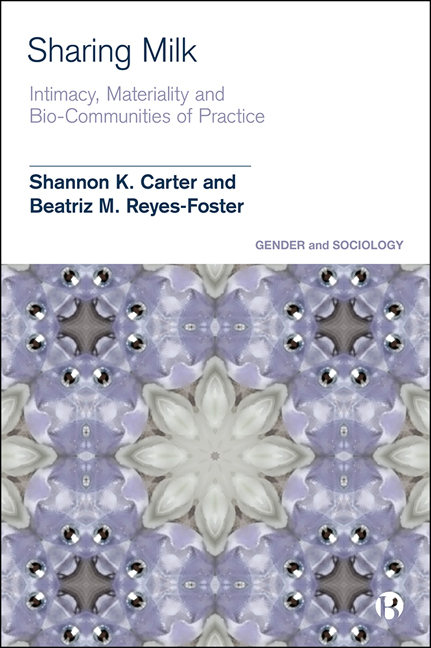Book contents
- Frontmatter
- Dedication
- Contents
- List of Figures and Tables
- Notes on the Authors
- Acknowledgements
- Preface
- 1 Introduction: Sharing Milk
- 2 Theorizing Milk Sharing
- 3 Entering Bio-Communities of Practice
- 4 Milk-Sharing Practices
- 5 The Milk-Sharing Network
- 6 Conclusion
- Notes
- Appendix A Survey Participant Demographics
- Appendix B Interview Participant Demographics
- References
- Index
3 - Entering Bio-Communities of Practice
Published online by Cambridge University Press: 10 March 2021
- Frontmatter
- Dedication
- Contents
- List of Figures and Tables
- Notes on the Authors
- Acknowledgements
- Preface
- 1 Introduction: Sharing Milk
- 2 Theorizing Milk Sharing
- 3 Entering Bio-Communities of Practice
- 4 Milk-Sharing Practices
- 5 The Milk-Sharing Network
- 6 Conclusion
- Notes
- Appendix A Survey Participant Demographics
- Appendix B Interview Participant Demographics
- References
- Index
Summary
Shannon and Beatriz first met at a coffee shop on campus during the beginning of the fall semester in 2013. I (Beatriz) was at the tail end of the first trimester of pregnancy with my second child. Unlike Shannon, I struggled, and ultimately was unable, to exclusively breastfeed my children. My first son, born as I was working to finish my dissertation, spent his first few days in the NICU, and I always believed that my inability to exclusively breastfeed him despite an environment that was generally supportive of breastfeeding was due to the fact that we were separated for the first few days of his life. My second child, another boy, was born under ideal circumstances. His birth was not traumatic, and we were able to initiate nursing immediately. The fact that I was now employed as a professor made the financial transition from one to two children fairly uneventful, and the flexibility of my schedule allowed me to spend most of my time with my baby, even when I returned to work (he became known as ‘my appendage’ because he spent most of his time in a wrap, sleeping against my chest). Nevertheless, his weight gain was extremely slow and his paediatrician became concerned. At his four-month appointment, my baby's weight had barely crept up from our prior checkup. On the growth charts, his weight had plummeted from the 24th percentile to the fifth.
Despite a parade of lactation consultants, breastfeeding support groups, ‘power pumping’ (aggressively pumping at short intervals to stimulate milk production), ‘breastfeeding vacations’ (stopping all activity and spending entire weekends in bed skin-to-skin with my baby), and an endless supply of various galactagogues (fenugreek, blessed thistle, fennel, moringa root, oatmeal, flax, brewer's yeast and Domperidone), my supply simply couldn't keep up with his demand. I had completely bought into the notion, freely circulating in my support circles, that low milk supply was due to social causes, that it was an artificial phenomenon resulting from aggressive formula marketing and ill-informed pediatricians following inaccurate growth charts based on the growth patterns of formula-fed babies.
- Type
- Chapter
- Information
- Sharing MilkIntimacy, Materiality and Bio-Communities of Practice, pp. 63 - 96Publisher: Bristol University PressPrint publication year: 2020



